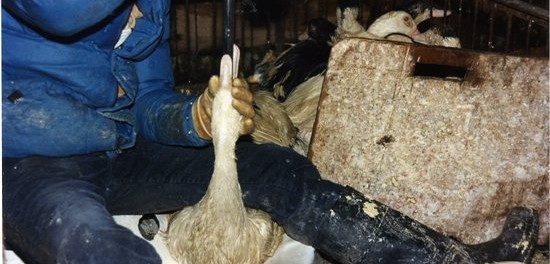Unlucky Ducks
 More than animal rights activists oppose this procedure.
More than animal rights activists oppose this procedure.
Article Review:
"End to California foie gras ban sends chefs, activists scrambling"
Reuters - Jan 09, 2015
An article in Reuters covering the reaction to California’s overturn of its foie gras ban—a piece that has been replicated throughout the media landscape—made a critical and very common error. The writers explain, “As chefs in California hurried to stock their kitchens with newly legal foie gras, animal rights activists on Thursday protested a federal judge’s decision overturning the state’s two-year ban on sales of the fatty liver of ducks and geese.”
The term I want to highlight here is “animal rights activists.” It is all too common in the mainstream media to characterize all opposition to animal cruelty as the exclusive work of this small segment of a much broader network of animal advocacy.
The problem with the term is, in part, that it carries a strong whiff of extremism. If the reaction was, in fact, radical and limited to self-identifying animal rights activists, the use of “animal rights activists” would be appropriate. But journalists need to recall that a majority of Americans are concerned about animal welfare. It’s thus, in this case, disingenuous to suggest that only a group of extremists were concerned about force-feeding ducks three times a day to fatten their livers.
Numerous other reports validate the extent of that opposition. Writing in The Guardian, Samantha Gillison, a self-described “unabashed omnivore” opposes the ban’s overturn. She explains, “I sincerely hope Attorney General Kamala Harris fights to get the ban reinstated,” noting how, “The price of getting to live among our fellow humans in a truly civilized society is that we have to repress some of our urges.”
It’s not only foie-gras-opposing individuals who have no affiliation whatsoever with animal rights activists. So do the editorial boards of major papers. As the Los Angeles Times editorialized, “The attorney general should appeal this ruling and defend the state’s right to enact humane laws.” The more one looks around at the coverage of California’s reaction to the ban’s overturn, the more it becomes clear that the only real supporters of it are chefs and foie gras producers.
So the upshot here is simple but important for journalists seeking to accurately reflect the depth of opposition to animal cruelty. When the term “animal rights activists” is substituted for what is in fact much broader disapproval, the issue at stake—the welfare of animals—is marginalized while those who profit from the abuse of animals are rewarded by appearing to be acting in a way consistent with mainstream values.

Animal rights activists?! Any one who would not be against the torture and suffering of other living beings deserves the same done to them! This is greed at the expense of sentient beings who have a right to live with dignity. An abomination!
Well said, Morgan! It is an abomination for sure.
I, as an advocate for the welfare of animals, was appalled when I read about this ruling. Certainly, as you suggest, the work needs to start up to get this reinstated.
I wonder how chefs and foodies justify supporting this heinous practice. Don’t they realize they are supporting promotion of pain and suffering and enjoying a diseased organ…. for egotistical reasons. http://www.pdfdrive.net/fatty-liver-hepatic-lipidosis-in-birds-causes-signs-and-treatment-e554484.html
Foie gras is pain on a plate.